The Microencapsulated Omega-3 Powders Market is estimated to be valued at USD 13.3 billion in 2025 and is projected to reach USD 29.3 billion by 2035, registering a compound annual growth rate (CAGR) of 8.2% over the forecast period.
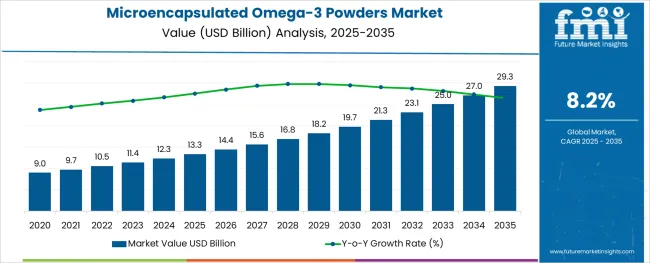
The microencapsulated omega-3 powders market is expanding rapidly due to increasing consumer demand for health supplements that support cardiovascular and cognitive health. The rise in awareness about the benefits of omega-3 fatty acids has driven interest in stable and easy-to-use powder formulations. The microencapsulation technology helps protect the sensitive omega-3 oils from oxidation, improving shelf life and enabling their incorporation into various food and beverage products.
Growing demand from the nutraceutical industry and increasing use in functional foods have also fueled market expansion. Distribution channels have evolved, with direct sales gaining prominence as companies build closer relationships with manufacturers and end-users.
The future outlook is positive as ongoing research supports the health benefits of omega-3s, and product innovation continues to improve bioavailability and consumer convenience. Segment growth is expected to be led by the Conventional nature segment, Direct distribution channels, and Docosahexaenoic Acid (DHA) as the leading omega-3 type.
The market is segmented by Nature, Distribution Channel, and Type and region. By Nature, the market is divided into Conventional and Organic. In terms of Distribution Channel, the market is classified into Direct and Indirect. Based on Type, the market is segmented into Docosahexaenoic Acid (DHA), Alpha-linolenic Acid (ALA), and Eicosapentaenoic Acid (EPA). Regionally, the market is classified into North America, Latin America, Western Europe, Eastern Europe, Balkan & Baltic Countries, Russia & Belarus, Central Asia, East Asia, South Asia & Pacific, and the Middle East & Africa.
The market is segmented by Nature, Distribution Channel, and Type and region. By Nature, the market is divided into Conventional and Organic. In terms of Distribution Channel, the market is classified into Direct and Indirect. Based on Type, the market is segmented into Docosahexaenoic Acid (DHA), Alpha-linolenic Acid (ALA), and Eicosapentaenoic Acid (EPA). Regionally, the market is classified into North America, Latin America, Western Europe, Eastern Europe, Balkan & Baltic Countries, Russia & Belarus, Central Asia, East Asia, South Asia & Pacific, and the Middle East & Africa.
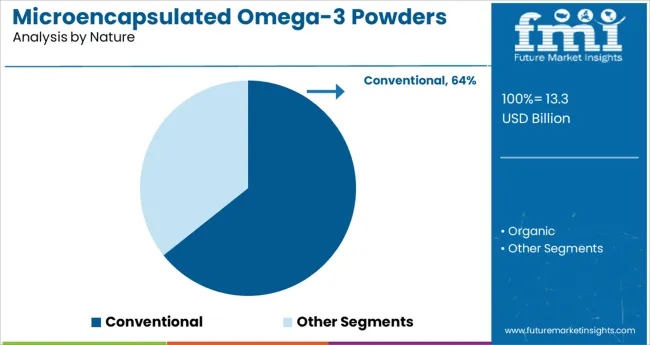
The Conventional nature segment is projected to hold 64.3% of the microencapsulated omega-3 powders market revenue in 2025, maintaining dominance over alternative sources. This segment’s growth is driven by its well-established production methods and cost-effectiveness. Conventional omega-3 powders, typically derived from fish oils, have long been trusted for their efficacy and bioavailability.
Consumers and manufacturers favor these powders for their consistent quality and scalability in supply. The segment also benefits from widespread regulatory approvals and safety profiles that support its use in dietary supplements and fortified foods.
As consumer demand for natural health products continues to rise, the conventional segment is expected to sustain its leadership in the market.
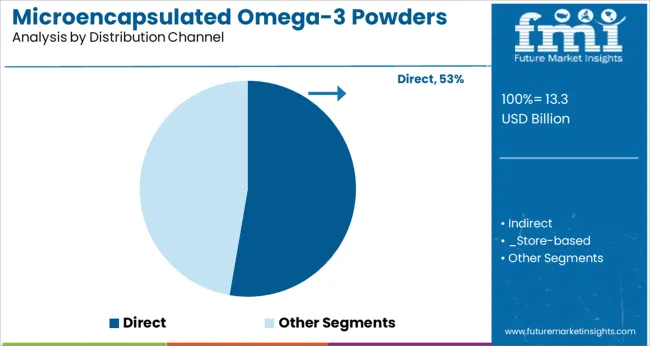
The Direct distribution channel segment is projected to account for 52.7% of the market revenue in 2025, positioning it as the primary channel for microencapsulated omega-3 powders. Direct sales enable manufacturers to establish strong partnerships with food producers, supplement companies, and pharmaceutical firms.
This channel allows for better customization, quicker order fulfillment, and reduced intermediary costs. Increasing demand for large-scale contracts and private labeling has encouraged suppliers to focus on direct engagement with end-users.
Additionally, the ability to provide technical support and collaborative product development has made direct distribution an attractive option. As supply chains become more integrated and demand grows, the direct channel is expected to remain the dominant route to market.
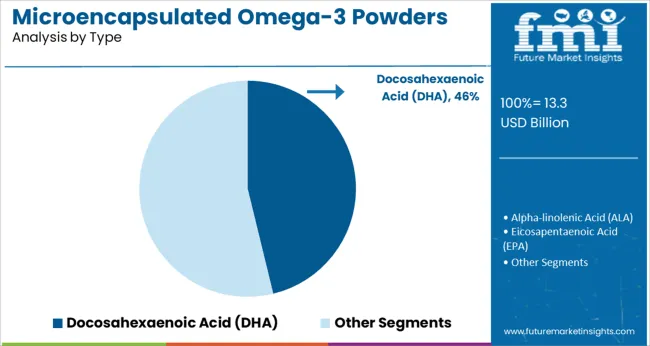
The Docosahexaenoic Acid (DHA) segment is expected to hold 46.2% of the microencapsulated omega-3 powders market revenue in 2025, securing its place as the leading omega-3 type. DHA’s importance in supporting brain development and cognitive function has driven strong consumer and industry focus on this compound.
Its incorporation into infant formulas, dietary supplements, and functional foods has become standard due to extensive scientific backing. The microencapsulation of DHA powders enhances stability and prevents off-flavors, making it easier to use in a variety of applications.
Manufacturers have increased their product offerings with DHA-rich powders to meet the rising health-conscious consumer base. With continuous research validating its health benefits, the DHA segment is poised to maintain its leading position in the market.
Increasing prevalence of cancer and cardiovascular disease stoked by rising health awareness and adoption of a sedentary lifestyle across the globe is anticipated to spur the microencapsulated omega-3 powders market growth in the upcoming years.
As per the World Health Organization (WHO), in 2024, cancer accounted for about 10 million deaths or 1 in 6 deaths worldwide. These numbers are projected to surge at a rapid pace in future years, thereby accelerating the market.
The WHO further mentioned that diabetes was considered to be the ninth leading cause of death in 2020, with a projected 1.5 million deaths directly caused by the disease.
Also, the number of people suffering from diabetes surged to 422 million in 2014 from 422 million in 2014 with high prevalence in low- and middle-income countries globally. The trend is set to continue during the forthcoming years with changing lifestyles and consumption of junk food, thereby fostering growth.
Conventional omega 3 ingredient producers, especially in emerging economies, find it difficult to provide their products at a competitive price range. It is more relevant for those manufacturers that deliver omega-3 ingredients from alternative sources, such as krill oils and algae oils. Apart from that, consuming very high amounts of omega-3 fatty acids with health supplements can surge blood sugar levels of those people living with diabetes.
Diarrhea is another common side effect of consuming excessive fish oil. Driven by the above-mentioned disadvantages, demand for microencapsulated omega-3 powders may decline in future.
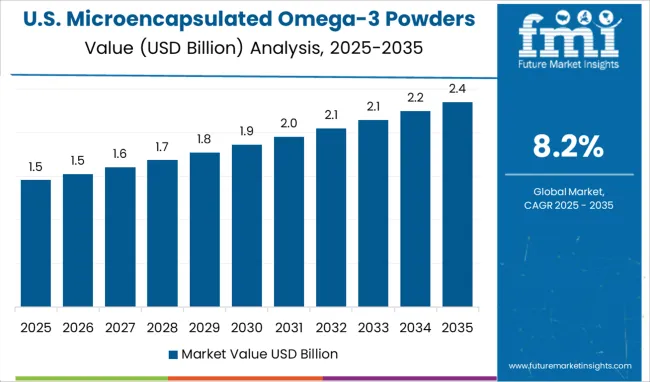
North America is anticipated to dominate in the evaluation period by generating the largest microencapsulated omega-3 powders market share. Increasing cases of heart-related issues and obesity in the USA and Canada are set to push the need for various health supplements, including microencapsulated omega-3 powders across North America.
Moreover, several manufacturers based in the region are focusing more on developing advanced production technologies. They are thus aiming to reduce oxidation in their manufacturing processes and eliminate environmental pollutants from fish oil.
A few North America-based producers are also striving to concentrate omega-3 content in their final products to ensure the delivery of healthy parameters of fish oil.
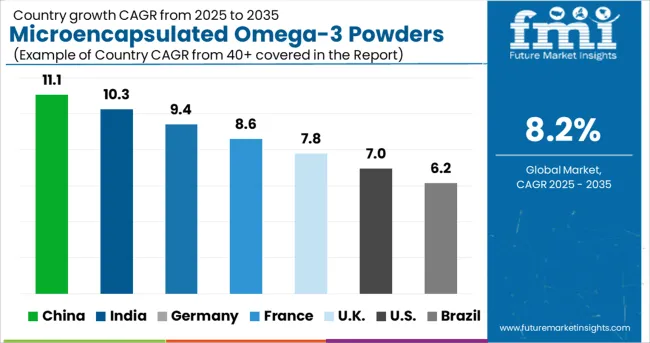
Increasing awareness among people living in India, China, South Korea, and Japan regarding the benefits of following a healthy diet is projected to augment the Asia Pacific microencapsulated omega-3 powders market size. Increasing population of young mothers and high birth rate across Asia Pacific are also set to spur the demand for infant nutrition, thereby pushing sales.
Additionally, increasing shift of consumers towards plant-based alternatives is compelling manufacturers to produce algae oil-based supplements. Growing vegan population across Asia Pacific is set to fuel sales of plant-based casing materials.
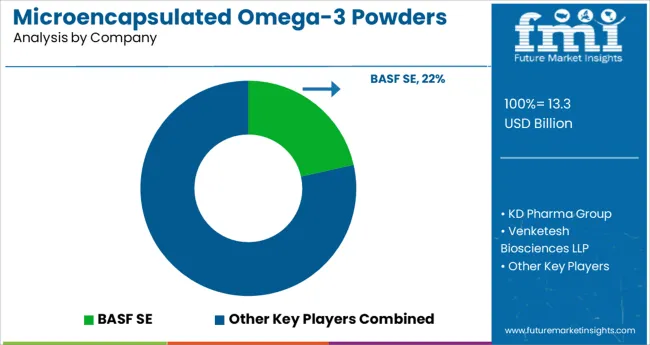
Some of the prominent companies operating in the global microencapsulated omega-3 powders market include Clover Corporation, Venketesh Biosciences LLP, Novotech Nutrition, Socius Ingredients, Koninklijke DSM N.V., KD Pharma Group, BASF SE, Wincobel, Skuny Bioscience Co., Ltd., Stepan Company, Glanbia Nutritionals, Biosearch SA and Benexia among others.
The global market is highly competitive in nature with the presence of various local and international key players. They are mainly focusing on developing well-differentiated products to generate high market share.
Some of the other key players are aiming to use non-fish sources for omega-3 extraction backed by the increasing trend of veganism in various parts of the globe. They are striving to find new algal sources as these do not have a fishy odor or taste, thereby making omega-3 ideal for the vegan population.
| Report Attribute | Details |
|---|---|
| Growth Rate | CAGR of 8.2% from 2025 to 2035 |
| Base Year for Estimation | 2024 |
| Historical Data | 2020 to 2024 |
| Forecast Period | 2025 to 2035 |
| Quantitative Units | Revenue in million and CAGR from 2025 to 2035 |
| Report Coverage | Revenue Forecast, Volume Forecast, Company Ranking, Competitive Landscape, Growth Factors, Trends and Pricing Analysis |
| Segments Covered |
Nature, Distribution Channel, Type, Region |
| Regions Covered |
North America; Latin America; Western Europe; Eastern Europe; APEJ; Japan; Middle East and Africa |
| Key Countries Profiled |
USA, Canada, Brazil, Argentina, Germany, UK, France, Spain, Italy, Nordics, BENELUX, Australia & New Zealand, China, India, ASEAN, GCC, South Africa |
| Key Companies Profiled |
Clover Corporation; Venketesh Biosciences LLP; Novotech Nutrition; Socius Ingredients; Koninklijke DSM N.V.; KD Pharma Group; BASF SE; Wincobel; Skuny Bioscience Co., Ltd.; Stepan Company; Glanbia Nutritionals; Biosearch SA; Benexia |
| Customization | Available Upon Request |
The global microencapsulated omega-3 powders market is estimated to be valued at USD 13.3 billion in 2025.
It is projected to reach USD 29.3 billion by 2035.
The market is expected to grow at a 8.2% CAGR between 2025 and 2035.
The key product types are conventional and organic.
direct segment is expected to dominate with a 52.7% industry share in 2025.






Full Research Suite comprises of:
Market outlook & trends analysis
Interviews & case studies
Strategic recommendations
Vendor profiles & capabilities analysis
5-year forecasts
8 regions and 60+ country-level data splits
Market segment data splits
12 months of continuous data updates
DELIVERED AS:
PDF EXCEL ONLINE
Microencapsulated Paraffin Phase Change Materials Market Size and Share Forecast Outlook 2025 to 2035
Microencapsulated Fish Oil Market
Fruit Powders Market Trends - Growth, Demand & Forecast 2025 to 2035
Superfood Powders Market Analysis - Size, Share & Forecast 2025 to 2035
Vegetable Powders Market Insights - Growth & Functional Benefits 2025 to 2035
Micronutrient Powders Market Trends – Growth & Industry Forecast 2025-2035
Demand for Fruit Powders in EU Size and Share Forecast Outlook 2025 to 2035
Waterless Cosmetics Powders Market Size and Share Forecast Outlook 2025 to 2035
Demand of MFGM-enriched Powders & RTDs in European Union Size and Share Forecast Outlook 2025 to 2035
Additive Manufacturing With Metal Powders Market Size and Share Forecast Outlook 2025 to 2035

Thank you!
You will receive an email from our Business Development Manager. Please be sure to check your SPAM/JUNK folder too.
Chat With
MaRIA